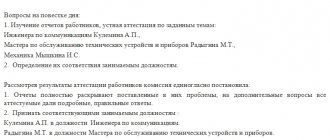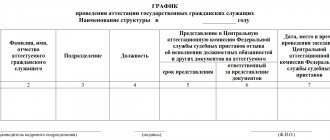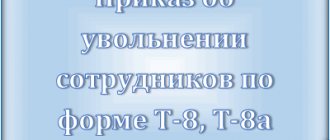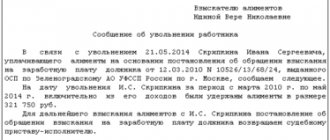What does it mean
Federal Law No. 79 “On the State Civil Service of the Russian Federation,” adopted in 2004, established the grounds for release.
These include:
- Agreement between employee and organization.
- Expiration of the contract.
- The desire of the employee.
- Initiative of the company's management.
The measure in question is applied if there are grounds specified in the laws. This is the failure to take any measures, the employee carrying out entrepreneurial activities, etc. For some categories of employees, exemption is applied subject to a corresponding decision of the head of state.
If we talk about the staff of an organization conducting business activities, it is assumed that the relationship with the employee will be terminated. The initiative comes from management. In fact, this action is similar to dismissal.
Normative base
Removal from a position actually means dismissal. The relationship between an employee and an employer is regulated by a set of rules collected in the Labor Code of the Russian Federation (formerly the Labor Code). It has primacy in matters relating to labor relations.
The Labor Code sets out in detail the rights and obligations of both the employer and the employee. It is he who explains issues related to the organization of labor protection, employment and dismissal from work, calculation and payment of wages. Some of his chapters and articles are devoted to the protection of socially vulnerable segments of the population, for example, pregnant women, disabled people, and minors. Specific specialties such as teacher, coach, athlete are also especially considered.
The Labor Code was adopted in 2001 and came into force in February 2002 after the termination of the Labor Code of the RSFSR.
The main changes in its wording were the prohibition of dismissing employees during their illness or vacations and the introduction of a payment upon termination of relations in the amount of two months' salary. This set of laws began to provide for overtime and limited the influence of labor organizations. Thus, the current Labor Code with all amendments was created to solve the following problems:
- ensuring guarantees and granting freedoms by the state for participants in the labor agreement;
- creating comfortable working conditions;
- conflict resolution;
- protection of the rights and interests of both the employer and the performer.
The articles of the code take into account the provisions specified in the Constitution of the Russian Federation and in no way contradict it, but only describe in detail what needs to be done in a particular labor situation.
In addition, the articles of the Labor Code are supplemented by the Law on Labor Protection, orders of the State Labor Service and other documents of various legal departments.
https://youtu.be/r_wYtTMmU0M
Difference from dismissal
Sometimes the release is represented by the transfer of a person to another position. The person will continue to work in this company. Transfer to a lower position is expected.
Demotion is a measure of punishment for an offense committed. For example, failure to fulfill the duties assigned to the employee. Dismissal implies the final termination of the employment relationship.
Art. 81 of the Labor Code of the Russian Federation grounds for dismissal
This norm contains a list of grounds for termination of employment relations.
These include:
- termination of the organization’s activities at the official level;
- reducing the number of employees at the enterprise;
- based on the results of the certification, a discrepancy was established with the person’s qualifications for the position he occupied;
- there is a change in the management of the enterprise and owners;
- repeated failure to fulfill the duties assigned to the person (it should be taken into account that he has previously received disciplinary sanctions and there are no valid reasons for such behavior);
- violation of duties of a gross nature;
- absenteeism without a valid reason;
- when an employee goes to work in a state of intoxication;
- a person commits an illegal act, expressed in embezzlement or theft of valuables from an organization;
- other reasons.
Menu
In this case, the period can be determined as permanent. Works to be combined:
- Increasing the service area or increasing the volume of work on core activities. For example, an accountant combines the work of the chief accountant while he is on vacation.
- Work other than the main one. For example, a foreman combines the position of a driver, driving around objects independently and performing work transportation.
In this case, when combining, the following payment conditions may be established:
- It is set as a percentage of the hourly rate of the combined profession.
- May be calculated as a percentage of the employee's daily earnings.
- The surcharge can be set to a fixed amount.
The Labor Code of the Russian Federation does not regulate the maximum standards for the minimum and maximum levels. It only stipulates here that the amount of payments is limited to the savings in the wage fund of the unemployed rate and is established by agreement of the parties.
Sample application for release
You can be relieved of your position by:
- transfer to another place of work;
- dismissals.
In both cases, you need to fill out an application. Otherwise, there are no grounds for terminating the employment relationship. The reasons for making such a statement are varied. For example, health status.
It will not be possible to completely relieve an employee from performing the duties assigned to him without terminating the employment agreement. The only possible option is to transfer to another place of work in the same company.
The application must indicate the name of the organization where the person works and information about the manager. Employee data is subject to reflection. The request for dismissal from office is indicated, indicating the reasons. At the end of the document, the employee puts the date of preparation and his signature.
A sample application for the General Director can be downloaded below:
How to punish for violations
A citizen has the right not to appear at the place and time specified in the summons only for a good reason. They are listed in paragraph 2 of Art. 7 53-FZ dated March 28, 1998. There is liability for absence from military training. But it is not as strict as for evading conscription. According to Art. 21 of the Administrative Code, failure by citizens to fulfill military registration obligations entails administrative liability. Those who do not want to participate in the testing sessions without a good reason will face a fine of 100 to 500 rubles.
The law also provides for administrative liability for the employer for failure to notify the employee of the call-up. The amount of the fine (Article 21.2 of the Administrative Code) is from 500 to 1000 rubles. Production conditions are not grounds for preventing an employee from fulfilling his military duty.
Sample order for dismissal from a position
To terminate an employment relationship with a specific employee or transfer him to another position, an order must be drawn up. Otherwise, the person may claim in court that the dismissal was illegal. The order reflects:
- Information about the company and its code.
- Name of the act.
- Document Number.
- Data of the employee who is being relieved of his position.
- Day and grounds for termination of employment relations.
- Information regarding the use of rest time.
- Manual data and its description.
Employer initiative
Termination of a working relationship at the initiative of the employer will be illegal while the person being dismissed is on vacation or sick leave. Dismissal of pregnant women and minors is also prohibited. To terminate a contract with the latter, it is necessary to obtain permission from the state labor inspectorate. But all these rules do not apply in case of liquidation of the organization.
There are only two reasons why an employer can fire an employee at will:
- guilty actions of the employee;
- circumstances beyond the control of the worker.
The first group of grounds includes gross violation of labor discipline by an employee. These could be illegal acts that fall under criminal liability, absenteeism, being drunk during working hours, violation of labor safety rules, or negligent attitude towards work duties. The second group of reasons involves staff reductions or complete liquidation of the enterprise, deterioration of the employee’s health, resulting in his inability to fulfill his duties.
Circumstances beyond our control
In this case, one of the main conditions for dismissal is to warn the employee about terminating the employment contract with him at least two months in advance. In this case, the organization must make every effort to find a suitable new job, as well as pay the required payments and compensation.
The procedure for dismissal for reasons beyond the employee’s control consists of the following stages:
- delivery of written notice two months before the date of dismissal against receipt;
- conversation with the boss and offer of all available vacant positions;
- issuance of a dismissal order;
- full payment.
In this case, it is important to offer all available vacancies to the employee in writing. This will help avoid possible litigation in the future.
Guilty actions
Dismissal for disciplinary offenses occurs in a different way. In order to terminate the employment relationship under this article, the employer must have clear evidence of the employee’s guilt.
The dismissal procedure can be represented as follows:
- receiving information about a disciplinary offense;
- collection of evidence;
- a written explanation by the employee of his action;
- issuing an order on disciplinary punishment in the form of dismissal;
- issuance of a work report with a notice of dismissal under Article 81 of the Labor Code.
It is also important to note that all evidence collected must be reflected in writing, otherwise the dismissal order may be appealed in court.
If the employee refuses to sign the order, an act is drawn up in the presence of three witnesses, which they must certify with their signatures.
Read more What does an effective contract with an employee mean?
If an employee does not pick up his work book, then he is sent a notification by mail. It is from this day that the employer is released from liability for the delay in issuing it. The shelf life of a work book is established by law for at least 50 years. The dismissed person may submit a written request to transfer the work to third parties or send it to him by mail.
An order to cancel the combination of positions is the basis for early termination of related work activities. If an employee for some reason cannot perform his job duties (goes on basic or study leave, is on sick leave), the employer has the right to assign his functions to another employee. However, there may be situations when the employer terminates the fulfillment of related obligations ahead of schedule, which is why a corresponding order is drawn up.
Release of the General Director
There are several reasons for the dismissal of the CEO.
Including:
- end of contract;
- committing unlawful acts;
- the will of the employee;
- change of owner of the company.
Labor relations can be terminated at the initiative of the founders of the organization. This option is considered the simplest. The sequence of actions is reflected in labor legislation.
The dismissal process is carried out on a general basis. They are reflected in Article 77 of the Labor Code. In addition, the basis may be the termination of the company's activities due to insolvency. When dismissing, you must comply with the law.
The basis may be a decision made at a general meeting of founders. It depends on the form of ownership of the enterprise. When these persons have given their consent, the process continues in the standard sequence.










